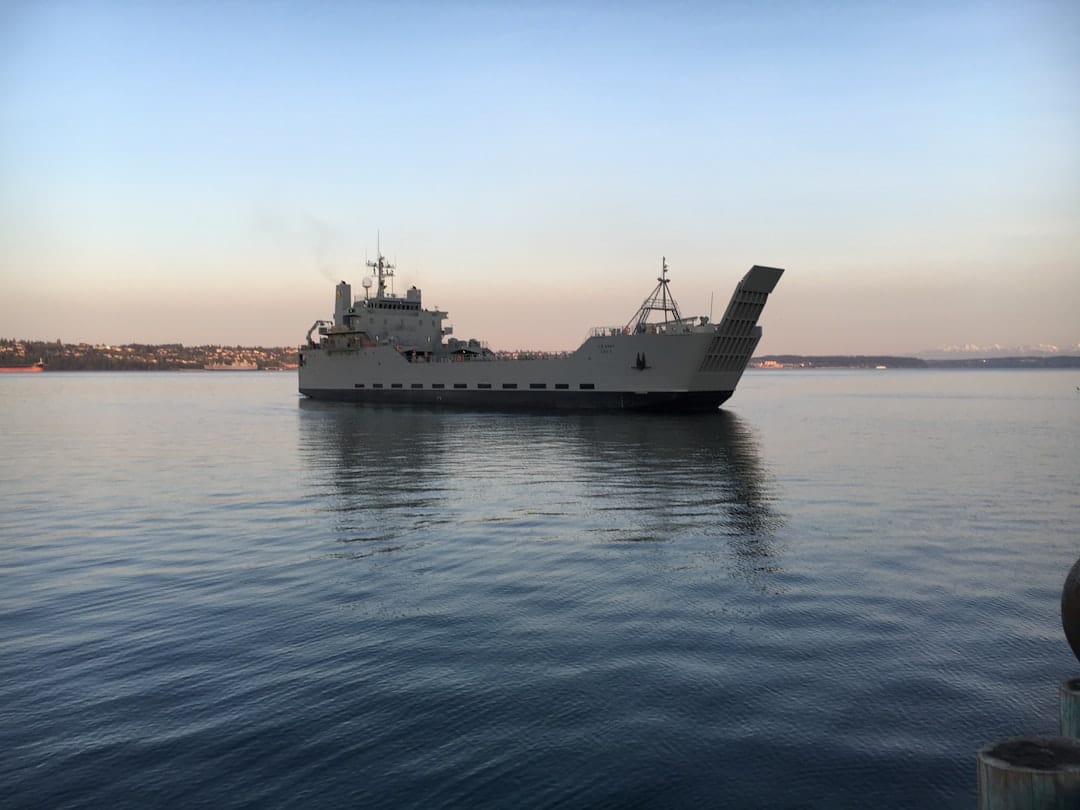The maritime industry has long been a cornerstone of global trade, facilitating the movement of goods across vast oceans and connecting economies. In recent years, the advent of autonomous ships has begun to reshape the landscape of maritime logistics. These vessels, equipped with advanced technologies such as artificial intelligence, machine learning, and sophisticated sensor systems, are designed to operate with minimal human intervention.
The integration of autonomous ships into maritime logistics promises to enhance efficiency, reduce operational costs, and improve safety at sea. As the world grapples with increasing demand for shipping services, the need for innovation in maritime logistics has never been more pressing. Autonomous ships represent a significant leap forward in addressing the challenges faced by traditional shipping methods.
By leveraging cutting-edge technology, these vessels can optimize routes, minimize fuel consumption, and reduce the risk of human error. The potential for autonomous ships to revolutionize maritime logistics is immense, but it also raises important questions about safety, regulation, and the future of the workforce in this sector.
Key Takeaways
- Autonomous ships are revolutionizing the maritime industry by introducing advanced technology to improve efficiency and safety in maritime logistics.
- Current challenges in maritime logistics include labor shortages, high operational costs, and environmental concerns, which autonomous ships aim to address.
- Advancements in autonomous ship technology include artificial intelligence, advanced sensors, and communication systems, enabling ships to operate without human intervention.
- Potential benefits of autonomous ships in maritime logistics include reduced operational costs, improved safety, and increased efficiency in cargo transportation.
- Regulatory and legal considerations for autonomous ships involve addressing issues related to liability, cybersecurity, and compliance with international maritime laws and regulations.
Current Challenges in Maritime Logistics
Maritime logistics is fraught with challenges that can hinder efficiency and increase costs. One of the most pressing issues is the unpredictability of weather conditions, which can lead to delays and increased operational expenses. For instance, storms and rough seas can force ships to alter their routes or slow down, resulting in longer transit times and higher fuel consumption.
Additionally, port congestion is a significant challenge that affects shipping schedules.
Another critical challenge is the reliance on human labor in maritime operations.
While skilled seafarers are essential for navigating complex waters and managing ship operations, human error remains a leading cause of maritime accidents. According to the International Maritime Organization (IMO), approximately 75% of maritime accidents are attributed to human factors. This reliance on human decision-making not only poses safety risks but also contributes to inefficiencies in operations.
Furthermore, the maritime industry faces increasing pressure to reduce its environmental impact, with stricter regulations on emissions and a growing demand for sustainable practices.
Advancements in Autonomous Ship Technology

The development of autonomous ship technology has made significant strides in recent years, driven by advancements in artificial intelligence and sensor technology.
This technology enables vessels to detect obstacles, navigate through congested waters, and make informed decisions without human intervention.
Companies like Rolls-Royce and Kongsberg have been at the forefront of developing these systems, showcasing their potential through successful trials. Moreover, machine learning algorithms are being employed to enhance decision-making processes on board autonomous vessels. These algorithms can analyze vast amounts of data from various sources, including weather forecasts, ocean currents, and traffic patterns, to optimize navigation routes.
For instance, the Yara Birkeland, an autonomous container ship developed by Yara International and Kongsberg, is designed to transport fertilizer between ports in Norway without a crew on board. This vessel utilizes advanced navigation systems that continuously learn from its environment, allowing it to adapt to changing conditions and improve its operational efficiency over time.
Potential Benefits of Autonomous Ships in Maritime Logistics
The integration of autonomous ships into maritime logistics offers numerous potential benefits that could transform the industry. One of the most significant advantages is the potential for increased operational efficiency. Autonomous vessels can operate around the clock without the need for rest breaks or shift changes, allowing for faster turnaround times and reduced transit durations.
This continuous operation can lead to more reliable shipping schedules and improved supply chain management. Additionally, autonomous ships have the potential to significantly reduce operational costs. By minimizing human crew requirements, shipping companies can lower labor expenses while also reducing the risk of costly accidents caused by human error.
Furthermore, autonomous vessels can optimize fuel consumption through advanced route planning and real-time adjustments based on environmental conditions. This not only leads to cost savings but also contributes to a reduction in greenhouse gas emissions, aligning with global efforts to promote sustainability in maritime operations.
Regulatory and Legal Considerations for Autonomous Ships
As autonomous ships become more prevalent in maritime logistics, regulatory and legal considerations will play a crucial role in their successful integration into the industry. Currently, international maritime regulations are primarily designed for manned vessels, creating a complex landscape for the operation of autonomous ships. The International Maritime Organization (IMO) is actively working on developing guidelines and frameworks that address the unique challenges posed by autonomous shipping.
One key area of concern is liability in the event of an accident involving an autonomous vessel. Determining responsibility when a ship operates without a crew raises questions about insurance coverage and legal accountability. Additionally, there are concerns regarding cybersecurity risks associated with autonomous ships, as these vessels rely heavily on digital systems that could be vulnerable to hacking or other malicious activities.
Establishing robust cybersecurity protocols will be essential to ensure the safe operation of these vessels.
Impact of Autonomous Ships on the Maritime Industry

The introduction of autonomous ships is poised to have a profound impact on the maritime industry as a whole. One significant effect will be on employment within the sector. While some roles may become obsolete due to automation, new opportunities will likely emerge in areas such as technology development, maintenance, and oversight of autonomous systems.
The transition may require reskilling existing workers to adapt to new roles that focus on managing and maintaining advanced technologies rather than traditional seafaring tasks. Moreover, the operational landscape of shipping companies will change as they adopt autonomous vessels into their fleets. Companies that embrace this technology may gain a competitive edge by offering faster and more reliable services while reducing costs.
This shift could lead to increased consolidation within the industry as smaller operators struggle to keep pace with larger companies that invest heavily in automation. The overall structure of maritime logistics networks may evolve as well, with greater emphasis placed on digital connectivity and data sharing among stakeholders.
Future Trends and Developments in Autonomous Ships
Looking ahead, several trends are likely to shape the future of autonomous ships in maritime logistics. One prominent trend is the increasing collaboration between technology companies and traditional shipping firms. Partnerships between these entities will facilitate knowledge sharing and accelerate the development of innovative solutions tailored to the unique challenges of maritime operations.
For example, collaborations between tech giants like Google or Amazon and established shipping companies could lead to breakthroughs in navigation systems or cargo management. Another trend is the growing emphasis on sustainability within the maritime industry. As environmental concerns continue to rise, there will be a push for autonomous ships that utilize alternative fuels or hybrid propulsion systems to minimize their carbon footprint.
Companies are already exploring options such as hydrogen fuel cells and battery-powered vessels as part of their commitment to reducing emissions. The integration of renewable energy sources into ship design will likely become a focal point for future developments in autonomous shipping.
The Future Outlook for Autonomous Ships and Maritime Logistics
The future outlook for autonomous ships within maritime logistics is one filled with promise and potential challenges alike. As technology continues to advance at an unprecedented pace, the maritime industry stands on the brink of a transformation that could redefine how goods are transported across oceans. While there are hurdles to overcome—such as regulatory frameworks and workforce adaptation—the benefits of increased efficiency, reduced costs, and enhanced safety are compelling reasons for stakeholders to embrace this change.
As we move forward into this new era of maritime logistics, it will be essential for industry players to collaborate closely with regulators, technology developers, and environmental advocates to ensure that the transition is both smooth and sustainable. The journey toward fully autonomous shipping may still be unfolding, but its implications for global trade and commerce are already becoming evident. The maritime industry must prepare for a future where autonomous vessels play an integral role in shaping logistics networks worldwide.
In the rapidly evolving world of maritime logistics, the future of autonomous ships is a topic garnering significant attention. As the industry looks towards automation to enhance efficiency and safety, it’s crucial to consider the technological advancements that support these innovations. A related article that delves into cutting-edge technology is “Exploring the Features of the Samsung Galaxy Book Odyssey.” This piece provides insights into the capabilities of modern computing devices, which are integral to the development and operation of autonomous systems. For more information, you can read the full article here.
FAQs
What are autonomous ships?
Autonomous ships, also known as unmanned ships or crewless ships, are vessels that can operate and navigate without a human crew on board. These ships are equipped with advanced technologies such as sensors, cameras, and artificial intelligence to perform various tasks at sea.
What are the benefits of autonomous ships?
Autonomous ships offer several potential benefits, including improved safety, reduced operational costs, increased efficiency, and the ability to operate in hazardous or remote areas without risking human lives. Additionally, autonomous ships can help reduce carbon emissions and fuel consumption, contributing to a more sustainable maritime industry.
What is the current status of autonomous ships in the maritime industry?
While the concept of autonomous ships is still in its early stages, significant progress has been made in the development and testing of autonomous technologies for maritime use. Several companies and research institutions are actively working on autonomous ship projects, and regulatory bodies are also beginning to address the legal and safety implications of autonomous shipping.
What are the challenges and concerns associated with autonomous ships?
Challenges and concerns related to autonomous ships include regulatory and legal frameworks, cybersecurity risks, potential job displacement for seafarers, and public acceptance of unmanned vessels. Additionally, there are technical challenges such as ensuring reliable communication and navigation systems, as well as addressing the ethical and moral implications of autonomous decision-making at sea.
How will autonomous ships impact maritime logistics?
Autonomous ships have the potential to revolutionize maritime logistics by streamlining supply chain operations, reducing transit times, and optimizing cargo handling processes. These vessels can also enable new business models and operational strategies for shipping companies, leading to increased efficiency and cost savings in the global logistics industry.

